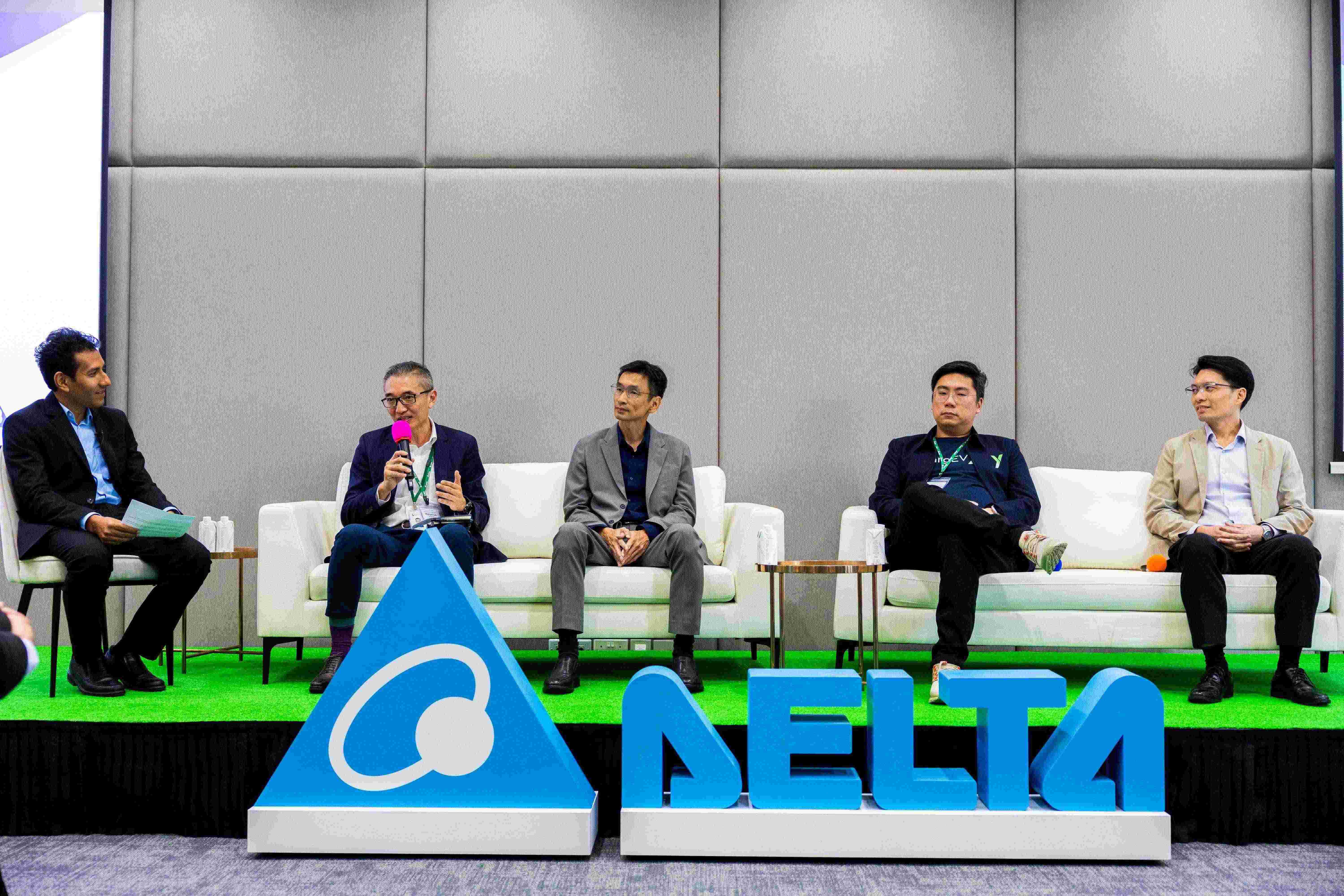Are ESS solutions the remedy to renewables integration intermittency woes?
In recent years, clean energy substitution has gained significant attention, funding, and at times, scrutiny. A notable concern is the intermittency of renewable energy sources such as wind and solar. After all, the quality of a power grid is defined by its ability to supply energy reliably.
To address this, Delta Singapore hosted a thought-provoking solution day titled Shaping Sustainability Through Greener Technology on June 21, 2024.
The esteemed panel explored the use of Energy Storage Systems (ESS) as a solution to intermittency challenges posed by renewables and the opportunities in the space, from a variety of perspectives – system aggregator, ancillary and key service providers, operators, and educators.

Panel discussion - "Shaping Sustainability Through Greener Technology"
From left to right: (Moderator) Kevin Tom, Platform Head of Energy Infrastructure, Delta Electronics, (Panelist) Michael Lim Tian, Head of Energy Services for SG & MY, SP Group, (Panelist) Tan Guangfan, Course Chair of School of Engineering, Ngee Ann Polytechnic, (Panelist) Chua Seng Teong, Managing Director, Yinson GreenTech – ChargEV, (Panelist) Jack Sheng Kee, R&D Senior Director, Delta Electronics
At the surface, using battery energy storage systems (BESS) to store surplus renewable energy for use during periods of low supply seems an elegant solution to the intermittency problem. Singapore, for example, aims to reach 2GW of solar energy deployment by 2030 and plans to maintain grid stability by simultaneously deploying ESS. However, the discussion uncovered various complexities associated with BESS.
First, short-term challenges to businesses – ChargEV representative Chua Seng Teong highlighted a myriad of challenges pertaining to the day-to-day implementation and use of BESS in the context of electric vehicle charging – ranging from cost to size to harmonic distortion. In response, Head of Energy Services for SG & MY, SP Group Michael Lim Tian, suggested that a collaborative ASEAN approach – rather than a country-by-country approach – to BESS adoption could help lower upfront costs. His position is aligned with the 2024 renewal and advancement of the ASEAN Power Grid (APG) , signalling a concerted and coordinated push for a more sustainable and interconnected energy future.
Second, from a macro standpoint, integrating ESS and BESS into power grids could potentially serve as a good buffer for the grid to react to fluctuations. Yet technical integration challenges, such as system-level integrations and rapid response, remain. To address this, Delta Electronics offers end-to-end ESS solutions, including design, power conditioning systems (PCS), batteries, control systems, and energy management systems (EMS). This integrated approach, coupled with their expert and dedicated team, can streamline system design and ensure compatibility, minimizing integration complexities.
The discussion also underscored that the complexities of leveraging ESS and BESS as a solution to intermittency goes beyond the remit of the R&D and engineering departments. With technologies such as multi-microgrids and vehicle-to-everything (V2X) coming into play, power grids are becoming incredibly multi-directional. New regulations and policies are needed to guide an entirely new business model – one where consumers can enjoy savings or even profit from the grid.
Predictive analytics – which the panellists touched on – could help facilitate this. While we are off to a good start – with renewable energy generators providing one to two day forecasts for the amount of energy they expect to generate – the industry still needs to amass datasets about energy consumption, sales, and generation patterns. Tan Guangfan, Course Chair of the School of Engineering at Ngee Ann Polytechnic, also highlighted that with Artificial Intelligence gaining traction, control algorithm optimization is becoming increasingly complex.
The next leg of innovation, then, according to Lim, is service providers such as Delta finding ways to track charging and discharging patterns in V2X as EVs gain popularity in Asia.
All stakeholders involved in the discussion brought salient points from their own unique perspectives. At this juncture, it is safe to say that while BESS is not the panacea to intermittency, it is a key part of ASEAN’s energy transition. As our grid becomes increasingly complex, mindsets and regulations may struggle to keep up. But the end goal remains – to build an efficacious grid. This, according to Delta Electronics R&D Senior Director Jack Sheng Kee, means “collecting the right amount of renewable energy at the right place, right time, and with the right method”.
DER: Powering Profits and Performance is a panel discussion hosted by Delta Singapore at Delta Future Forward 2024, a Delta initiative to bring together thought leaders for knowledge sharing on how Distributed Energy Resources (DERs) have transformed the energy landscape by reducing dependency on traditional utilities, lowering carbon emissions, and cutting tariff bills.
Click
here to watch the highlights of Delta Future Forward, and view the full panel discussion
here.